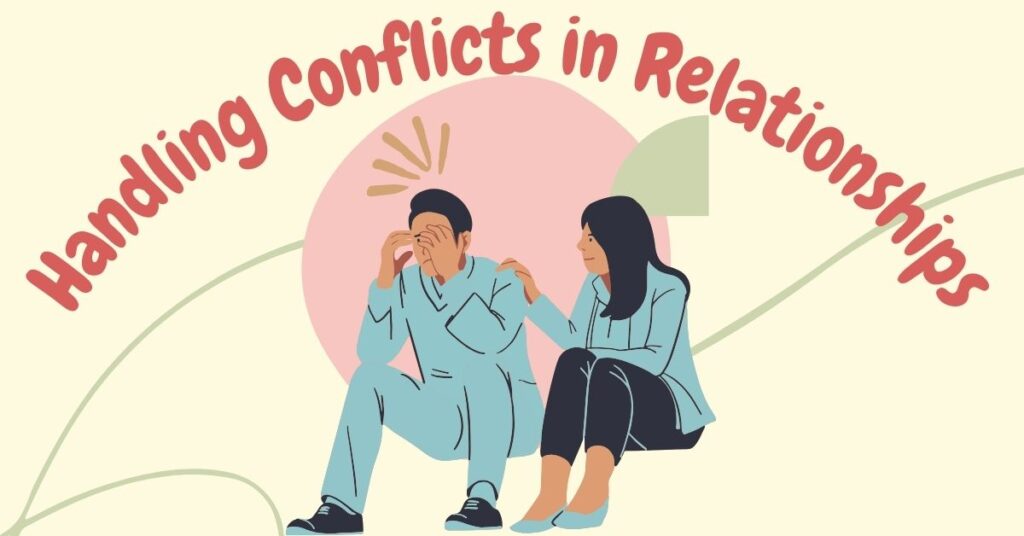By: Fardeen Rafique

Date: 15th December 2021
It is more rewarding to resolve a conflict than to dissolve a relationship – McDowell, 2000.
Conflict in relationships can be viewed via both a positive as well as a negative lens. Conflict is, in fact, one of the most common factors that lead to emotional, physical as well as psychological problems in adults and children alike. Conflicts in relationships can arise due to several reasons, ranging from having contrasting views, attitudes and opinions on a plethora of topics.
Since, the presence of conflict in relationships has the capacity to often bring about negative feelings, emotions and behaviours, individuals often feel inclined toward finding ways and methods to manage and resolve conflicts.
Whenever any kind of conflict arises in a relationship it is important to understand that:
· Just because there have been opposing views, opinions and attitudes doesn’t mean that the relationship will not work out or that it is unusual to have fights in a relationship.
· One should also become aware that having conflicts in relationships is only natural and healthy and dealing with them effectively can lead to strong and lasting relationships.
· It is also important for individuals in the dynamic to have a mutual agreement of breaks during emotional flooding, especially when they feel as though things are getting out of hand and they might hurt their significant other.
· Agreeing to take a break when things start to escalate by both the parties is essential. Even during the break, it is necessary to stop ruminating about the conflict but to give yourself the time and space and bring yourself to the present moment. Being in the present and experiencing the surroundings so as to calm oneself down.
Therefore, we can say it’s not just about the break but how and what one does during that break that will eventually determine whether you go back to the other person with the intention to resolve the conflict or whether you go back feeling even more emotionally worse off leading to an elevation in conflict.
· Lastly, agreeing to come back when both are ready to resolve the conflict is of utmost importance. In order for this to happen both the individuals need to be in a common emotional space and resolve the conflict in a calm and peaceful manner.
Conflict is natural and a normal part of all kinds of relationships. Just because conflict arises it does not mean that there is something wrong in the relationship. Problems in relationships are inevitable but they definitely could be worked upon.
Discussing Attachment Injuries
A common factor playing a role in conflicts is an attachment injury. Most prominently seen in conflicts within romantic relationships, attachment injuries refer to past emotional injuries that an individual might have experienced that has not yet been resolved and thus has the potential to act as a trigger at any given point (Johnson, 2001). These emotional injuries may have occurred in the present relationship or in a past relationship.
There are 5 steps involved in discussing about emotional injuries
- The parties should always focus on describing how they feel
- They need to express their individual personal realities
- Exploring any underlying triggers is essential
- Taking responsibility and apologizing for one’s own side is of utmost importance
- Forming productive plans for healing can also help
Importance of Repairing through Active Listening
Another way in which conflicts can be resolved include; being present in the moment and truly listen to what the other is saying. One must not listen to react instead they must listen to understand their experience. As a listener, one should also be able to provide a safe space for the other and be completely non-judgmental. In some cases, a small compromise can also go a long way. In case the goals are poles apart, the individuals must work on finding common ground, finding things that overlap and then they can start working on their conflict from there.
Mediation As a Conflict Resolution Tool
Studies have shown that mediation as a conflict resolution tool is effective in solving conflict as well as cost efficient (Dana, 2001). It has been found that the use of mediation in resolving conflicts improves the quality of discussion, between individuals and couples, as well as serves as an appealing and an emotionally rewarding conflict resolution process for the ones involved regardless of the outcome. Furthermore, mediation leads to more satisfaction with the content and process of discussion leading to development of positive feelings rather than negative ones. Therefore, depending on the comfort level of individuals, they can have a third person act as a moderator if they feel like it will be helpful to them.
Individuals who are able to navigate through all the problems in the relationship learn over time of course to accept the other’s personality, appreciate each other and also respect the differences in their views and perceptions on various topics.
Inspiron’s Conflict Resolution Technique – C-O-U-R-S-E Method
Just like conflicts in a relationship may feel like a difficult course you need to complete and overcome, the acronym COURSE below, developed by us here at Inspiron can serve as a useful means of approaching conflicts and resolving them.
C – Communicate effectively. Be honest and assertive about your needs to convey your stance on what made you feel the way that you did.
O = Keep an Open-mind to perspectives other than your own. Be ready to listen without judgement to others’ perspective, and accept that not everyone may have the same opinion or view as you.
U – Understand the person’s points of reference and perspectives. Everyone has their own set of experiences that serve as lens in viewing a particular situation. Understand where the person may be coming from.
R – Respond rather than react. Take a step back and re-approach the situation instead of thinking of getting back at the person on the spot.
S – Assess the Space you have created for others and for yourself. It will help you take accountability for your behavior and emotion and help understand others’ share of accountability.
E – Emotional regulation is key; ground yourself, and take time-outs to compose yourself and organize your thoughts in a healthy manner.




